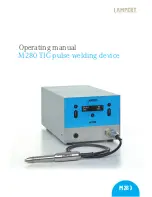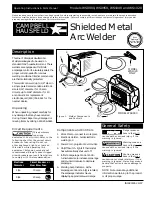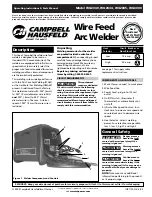
094025_i_gb_wkstwin_s
haacon hebetechnik gmbh – Phone +49 (0) 9375 - 84-0 – Fax +49 (0) 9375 - 8466
1
OPERATING INSTRUCTIONS
(Translation)
Car body hoist, Cable reel jack
Type 1094.8
1095.8
1. User groUps
Duties
Qualifications
Operator Operation,
visual inspection
Instruction by means of the operating
instructions; Authorised person 1
Special-
ist per-
sonnel
Assembly, disassembly,
repair, maintenance
Mechanic
Tests
Authorised person 2 per TRBS-1203a
(Technical expert)
2. sAFeTY INsTrUCTIoNs
Where to use this winch
Operate the equipment in accordance with the information in
these operating instructions.
– Only use to lift and lower freely-movable loads.
– Only use when in perfect working order.
– Only allow to be operated by personnel instructed on how to do so.
safety-conscious work
– First read the operating instructions.
– Always be conscious of safety and hazards when working.
– Ensure stability.
– Observe lifting device and load during all movements.
– Immediately report any damage or defects to the person in
charge.
– Repair equipment first before continuing work!
The following are not allowed:
– Overload (--> technical data, type plate, payload plate)
– Mechanical propulsion.
– Impacts, blows.
– Stay on, under or in the movement area of the container
and the car body hoist.
Use exclusions
– Not suitable for permanent operation and vibration stress.
– Not approved for use as builders’ hoist (BGV D7).
– Not approved for use in explosive areas/environments.
– Not suitable for aggressive environments.
– Not suitable for lifting hazardous loads.
organisational measures
– Ensure that these operating instructions are always at hand.
– Ensure that only trained personnel work with the equipment .
– Check at regular intervals whether it is being used in a safety and hazard
conscious manner.
Installation, service and repair
Only by specialist personnel!
Only use original spare parts for repairs.
Do not modify or alter safety-relevant parts!
Additional attachments must not impact safety.
Further regulations to be observed are
– German Industrial Health and Safety Ordinance (BetrSichV).
– Country-specific regulations.
– German Accident prevention regulations (BGV D8).
3. TeCHNICAL DATA
Type
1094.8 1095.8
Permitted load, claw / top
kN
7 / 8
Lift / crank turn
Low gear
Fast gear
mm
mm
0,53
5,3
Crank force
N
110
Lift
mm
480
Weight
kg
75
Subject to design and implementation changes.
Special design! Pay attention to the serial number plate and the drawing.
4. geNerAL
The car body hoist is designed for raising car bodies and for supporting
containers and interchangeable truck bodies.
The main application is repairs to commercial vehicles (replacing
brakes, springs and axles).
The self-locking trapezoidal spindles and maintenance-free bevel gears
ensure that it is easy and safe to use.
The car body hoist complies with Accident Prevention Regulation BGV D8.
gB
5. operATI oN
The trapezoidal spindle is driven by a spur gear using the crank handle.
The spindle and gear parts are protected by sturdy telescoping square
tubes. The unit can be moved on rollers.
Type 1094.8 / 1095.8:
The hoist claw can be positioned in four fixed positions on the shaft.
6. INsTALL ATIoN
The car body hoist is ready for use.
7. oper ATIoN
Type 1094.8 / 1095.8:
Loads can be raised and lowered only in low gear.
In rapid traverse gear the car body hoist can support a load of 1.5
tonnes, in load gear it can support a load of 8 tonnes.
switching to rapid traverse gear:
Pull out the crank handle.
switching to load gear:
Push in the crank handle. The switch lock
must engage.
support loads safely. ensure that you use stable load
support points. Check that the load is supported safely
after raising it a little. Watch the load and load support
equipment at all times during the raising and lowering
process.
The load capacity of the ground must be at least 2.5 kp/cm².
Type 1094.8 / 1095.8:
After positioning the hoist claws secure the bolts with spring pins.
8. TesTINg
The equipment must be inspected in accordance with the conditions of
use and the operating conditions at least once per year by an authorised
person 2 per TRBS 1203 (Technical expert) (testing per BetrSichV, §10,
sect.2 represents implementation of EC Directives 89/391/EEC and
95/63/EC and the annual occupational safety inspection per BGV D8,
§23, sect. 2 and BGG956). These inspections must be documented:
– Before commissioning.
– After significant alterations before recommissioning.
– At least once per year.
– In the event of unusual occurrences arising that could have detrimen-
tal effects on the safety of the winch (extraordinary tests, e.g. after a
long period of inactivity, accidents, natural events).
– After repair works that could have an influence on the safety of the
winch.
Technical experts (AP2) are persons, who have sufficient knowledge
based on their specialist training and experience, in the areas of
winches, lift and pull systems, and familiarity with the relevant official
occupational health and safety rules, accident prevention regulations,
guidelines and generally accepted engineering rules (e.g. EN stand-
ards), to evaluate the operational safety of winches, and lift and pull
systems. Technical experts (AP2) are to be nominated by the opera-
tor of the equipment. Performance of the annual occupational safety
inspection as well as the training required to obtain the aforementioned
knowledge and skills can be provided by haacon hebetechnik.
9. MAINTeNANCe reCoMMeNDATIoN
The operator determines the intervals themselves based on frequency
of use and the operating conditions.
– Regular cleaning, no steam jets!
– General overhaul by the manufacturer after 10 years at the latest.
CAUTIoN!
Only perform inspection, maintenance and repair work on an
unloaded hoist. Only allow work on brakes and locks to be per-
formed by qualified specialist personnel.
Maintenance and inspection work
Intervals
Visual and functional tests
Before
every use
Brake function under load
Relubrication (lubricating nipple), while doing so deploy
and retract the unit over its full stroke length
Every 6
months
Inspect spindle and nut for wear, replace if necessary,
lubricate
Annually
Check type plate for legibility
Professional inspection
Check gear parts, replace if necessary, lubricate
Every 2 - 5
years
Lubricant recommendations:
Multi-purpose grease per DIN 51502 K3K-20
10. spAre pArTs
The following data should be given with each order:
– Type number and serial number of the equipment / Pos. and Part
number.
11. DIsAsseMBLY, DIsposAL
– Make sure to observe the safety instructions.
– Dispose of the equipment and the substances within it in an environ-
mentally responsible manner.
-
20° C
+50° C




















